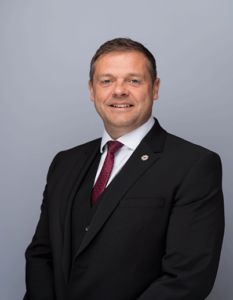 As a child, once the dream of professional football passed, I knew I wanted to work with young people and involve sport. A PE teacher supported and mentored me to explore Physical Education teaching. As a ‘first-in-family’ to attend University this guidance and support was essential and well received. I was accepted on a 4-year Bachelor of Arts with Qualified Teacher Status in Physical Education and Mathematics at St. Mary’s University College in Twickenham.
As a child, once the dream of professional football passed, I knew I wanted to work with young people and involve sport. A PE teacher supported and mentored me to explore Physical Education teaching. As a ‘first-in-family’ to attend University this guidance and support was essential and well received. I was accepted on a 4-year Bachelor of Arts with Qualified Teacher Status in Physical Education and Mathematics at St. Mary’s University College in Twickenham.
During my sporting career I had always relished and been successful in leadership roles so knew quickly I wanted to progress in school. I taught for 4 years in Berkshire before gaining a Head of PE role in the West Midlands. In this role I was asked to write and submit a bid for the school to become a Specialist Sports College which was successful and led to subsequent promotion to Assistant Headteacher with responsibility for teaching & learning and CPD.
A relocation and further opportunities to set up and lead a Teaching School Alliance and a School Centred Initial Teacher Training (SCITT) provider led to a further promotion to Deputy Headteacher. It was whilst in this role that several opportunities were made available to me; firstly, to visit Auschwitz with two students through the Holocaust Education Trust; secondly to support the work in school on Holocaust and Genocide Education – largely in partnership with the UCL Centre for Holocaust Education as we became a ‘Beacon School’ and thirdly to support UCL in establishing a quality assurance process for their Holocaust Beacon School programme. These opportunities had a profound impact on me as a person and as a leader.
One cannot help but be personally affected by the horrors of the Holocaust and visiting Auschwitz made me reflect not only on my life but what the purpose of education is – exam results are important, but empowering young people to change the world through developing self-agency is, I would argue, the ultimate role of any education system. In working closely with UCL I developed further clarity in my thinking around CPD and quality assurance which supported and contributed to me becoming Headteacher of a secondary school in South Gloucestershire. Developing rigorous and robust quality assurance and CPD that was ‘done with’ people, not ‘done to’, was a key factor in rapidly improving the school and moving it from Special Measures to Good in two years. I also wanted to ensure young people in the school had similar opportunities to the previous school I had worked in so we set about becoming a Holocaust Beacon School ourselves. Whilst still being at a relative early stage of development this has already had an impact on young people and through the Beacon School model is spreading this work wider afield.
In my current role as Deputy CEO of a trust of schools and leading on school improvement I have begun exploring what impact Holocaust and Genocide Education can have across a group of schools. The challenges Headteachers have faced and continue to face as a result of the pandemic, as well as the pressure for academic results can often seem at odds with Holocaust Education, however our view is increasingly that the impact of education is the indelible imprint that our school lives have on us; what remains built up in our schema and behaviours, and without question the power of Holocaust Education has the potential to transcend academic results and leave a profound and long lasting impact on young people’s lives. In turn, this has the potential to have a positive impact on society and fulfil our key civic duty as educators.

